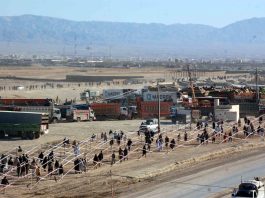Peshawar: Nizakat was eleven when her father gave her in marriage to her cousin. She was the eldest of her sisters and brothers but still a child who loved to play.
“I got married at an age when children love to play,” said Nizakat. “My cousin who loved with me convinced my father that he would take care of me. Since my father was disabled and my brothers too young to work, he quickly agreed when my cousin proposed.”
Nizakat has four children now – three sons and a daughter. After three years of marriage, she says, her husband started fighting with her, beating her up every day. “I was restricted to my room. For months, I would stay in, never leaving the room, not allowed to go out.”
It was then that her husband started staying away from home. She found out he had married another girl. When Nizakat confronted him, he beat her up and divorced her.
She returned to her father’s home along with her children. Her father old and disabled and brothers too young to work, Nizakat said she had no option but to work and earn for her children. That is when she and her sisters decided to leave home.
She now lives with her two young sisters in a single rented room at Hashtnagari, a commercial and residential district inside Peshawar’s old city. Every day, she and her sister travel all the way to the other end of the city to work in a medicine factory at an industrial estate in Hayatabad, a town bordering the tribal areas at the western edge of Peshawar.
It hasn’t been easy for Nizakat and her sisters to make the transition from their village in Shabqadar, a town bordering the Mohmand Agency in the tribal areas, where women rarely leave home. It is considered against the norms of traditional Pakhtun society that prohibits young girls to live alone outside their homes, much less work in the city, alongside men.
“My sister and i have never been to school,” Nizakat told News Lens. “There is no concept of female education in the Shabqadar teshsil where we come from. That is why we had to agree even to a pay as little as Rs 5000 per month. It is very little for our needs but what do we do.”
Nizakat and her sisters are among the 30,000 women who, according to the Khyber Pakhtunkhwa Directorate of Labour, work in 775 factories in the province. In industrial estate Hayatabad where Nizakat and her sisters to to work, there are 5000 young girls working as part of the labour force in medicine, match and tissue paper factories.
A majority of these women are aged between 15 to 35 as women above this age bracket are not encouraged by factory owners due to the hard labour needed in the factories.
Kulsoom, who has been working in a medicine factory for the last four years and travels a considerable distance daily to Hayatabad from her home at Kohat Road in Peshawar, says the behavior of factory owners with employees is harsh.
“They treat us like slaves,” says Kulsoom who is 23. “All the girls here come from poor families. A majority of them have lost breadwinners like fathers or husbands or they are drug addicts.”
Kulsoom said if any of the men or women got hurt while working on the machinery, they didn’t get any medical coverage or attention from the factory management.She said in the last three years, she had only received a raise in her salary only once and that too only of Rs 1000 which was not enough for her needs. “When the labour inspection team visits the factory, the owners force us to give them inflated figures as salaries.”
Rabia, who hails from Gulbahar in Peshawar, used to work with two of her sisters in a medicine factory in industrial estate at Hayatabad. For the last nine months, she has been in bed after developing respiratory complications. Rabia’s father is dead and two of her brothers are very young but work in an auto -workshop.
“In these nine months, no one asked us about my condition or the situation we are in”, Rabia said.
According to the International Labour Organisation (ILO), gender disparities in labour force participation rates are severe in Pakistan, with male employment approaching 80 percent compared to a female employment rate of less than 20 percent between 2009 and 2012.
In the northern, tribal Pakistan, religious and cultural mores keep women confined to home, and unable to stray beyond the traditional roles of wife, mother, and housekeeper.
Experts also say the proportion of women workers occupying white-collar jobs is very limited, since even educated women are discouraged from entering the public service.
According to the Pakistan Economic Survey for 2013-2014, women have traditionally populated the informal sector, taking up jobs as domestic workers and other low-paid, daily-wage professions as cooks or cleaners, where affluent families typically pay them paltry sums of money.
In contrast, their share of professional clerical and administrative posts has been less than two percent. The most popular jobs were found to be in medicine, banking, law, engineering and especially education.
Khyber Pakhtunkhwa Industries, Commerce and Labour Department Deputy Director Hidayatullah Khan said that after the 18th amendment, the KP Assembly had passed seven acts in 2013 which included Khyber Pakhtunkhwa Payment of Wages Act, 2013, Khyber Pakhtunkhwa Minimum Wages Act 2013, Khyber Pakhtunkhwa Factories Act 2013, Khyber Pakhtunkhwa Maternity Benefits Act 2013, Khyber Pakhtunkhwa Workers Compensation Act 2013, Khyber Pakhtunkhwa Industrial and Commercial Employment (Standing Orders) Act, 2013, Khyber Pakhtunkhwa Industrial Statistics Act, 2013.
He said that the number of registered running factories in Khyber Pakhtunkhwa was 781 in which 54485 male and female labour workers were employed. Khan said that the minimum salaries of a worker in factory was Rs 10,000 and the factories were bound to provide one meal, tea two times a dat andmedical facilities.
He said that the labour department inspected factories regularly and took immediate action against owners who did not fulfill the requirement of employees. He said that due to lack of awareness employees did not register complaints. He suggested that the employees make or join a union so they could contact the labour directorate in case of a complaint.
“We will visit the factory, hear the grievances of the employees and take action within a week,” said Khan.



